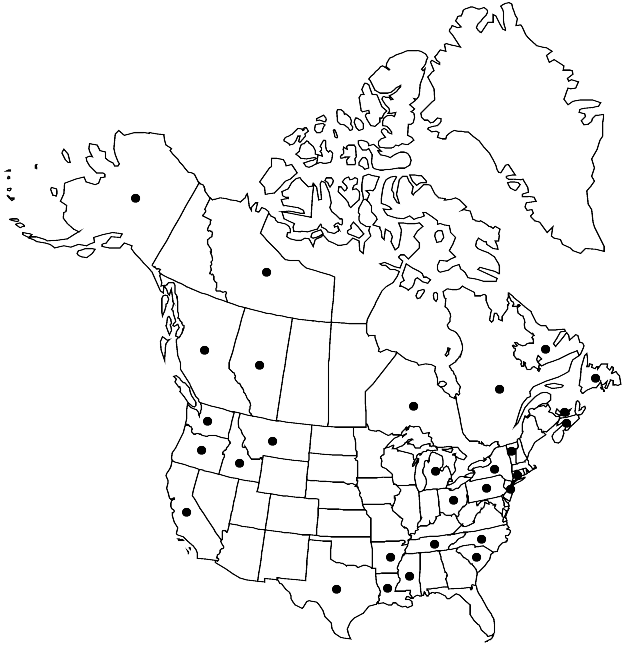Plagiomnium rostratum
Ann. Bot. Fenn. 5: 147. 1968.
Erect stems 1–2 cm, not dendroid; sterile stems to 6 cm. Leaves light to dark green, sometimes black with age, crisped and contorted when dry, flat or sometimes weakly undulate in older leaves when moist, broadly elliptic or ovate, 2.5–4(–7) mm; base not or weakly decurrent; margins weakly toothed distally or to near base, occasionally entire, teeth blunt, of 1 (or 2) cells; apex broadly rounded, truncate, or retuse, rarely emarginate, apiculate or rarely cuspidate, cusp smooth; costa percurrent, short-excurrent, or rarely subpercurrent; medial laminal cells short-elongate or ± isodiametric, 22–35(–45) µm, slightly smaller near margins, in indistinct longitudinal or diagonal rows, strongly collenchymatous, walls not pitted; marginal cells linear or sometimes short-linear, in 3–5 rows. Sexual condition synoicous. Seta 1–4, yellow, reddish with age, 1.5–3(–4) cm. Capsule horizontal to pendent, cylindric or oblong-cylindric, 2.5–4.5 mm, neck not distinct; operculum rostrate. Spores 22–33 µm.
Phenology: Capsules mature late spring–summer.
Habitat: Calcareous cliffs, woods, rock, soil
Elevation: low to moderate elevations
Distribution

Alta., B.C., Nfld. and Labr., N.W.T., N.S., Ont., P.E.I., Que., Alaska, Ark., Calif., Conn., Idaho, La., Mich., Miss., Mont., N.J., N.Y., N.C., Ohio, Oreg., Pa., S.C., Tenn., Tex., Vt., Wash., Mexico (Coahuila), South America, Europe, Asia, Africa, Indian Ocean Islands, Pacific Islands, Australia.
Discussion
Plagiomnium rostratum is characterized by its small size, often retuse or emarginate leaf apices, not or weakly decurrent leaves, small, blunt marginal teeth, and, in fertile collections, long-rostrate opercula. Plants are commonly observed as masses of sterile stems growing closely to the substratum.
Selected References
None.